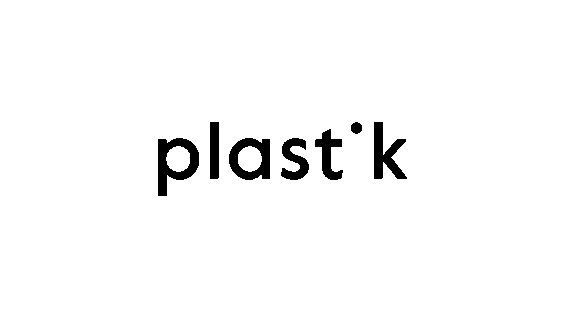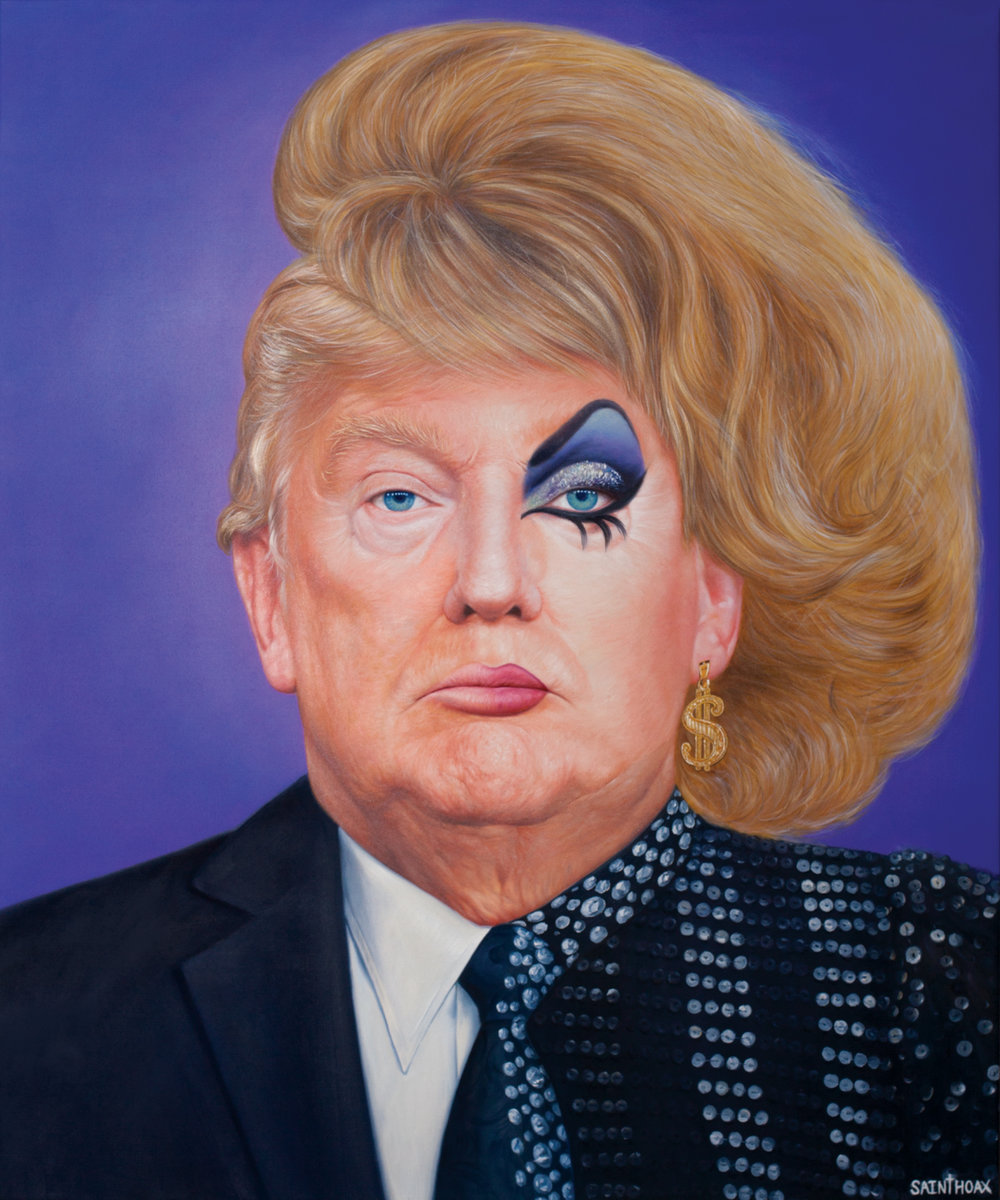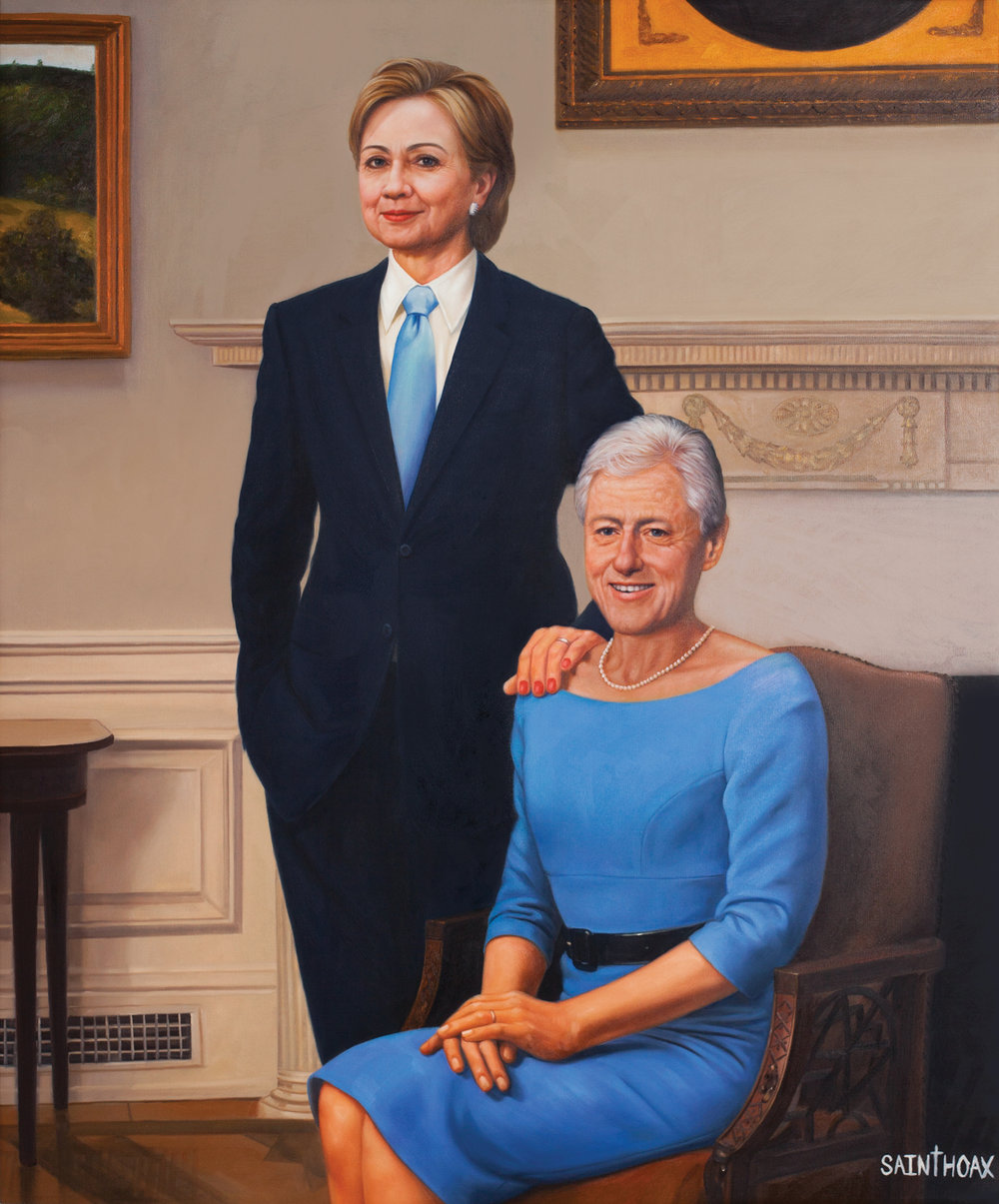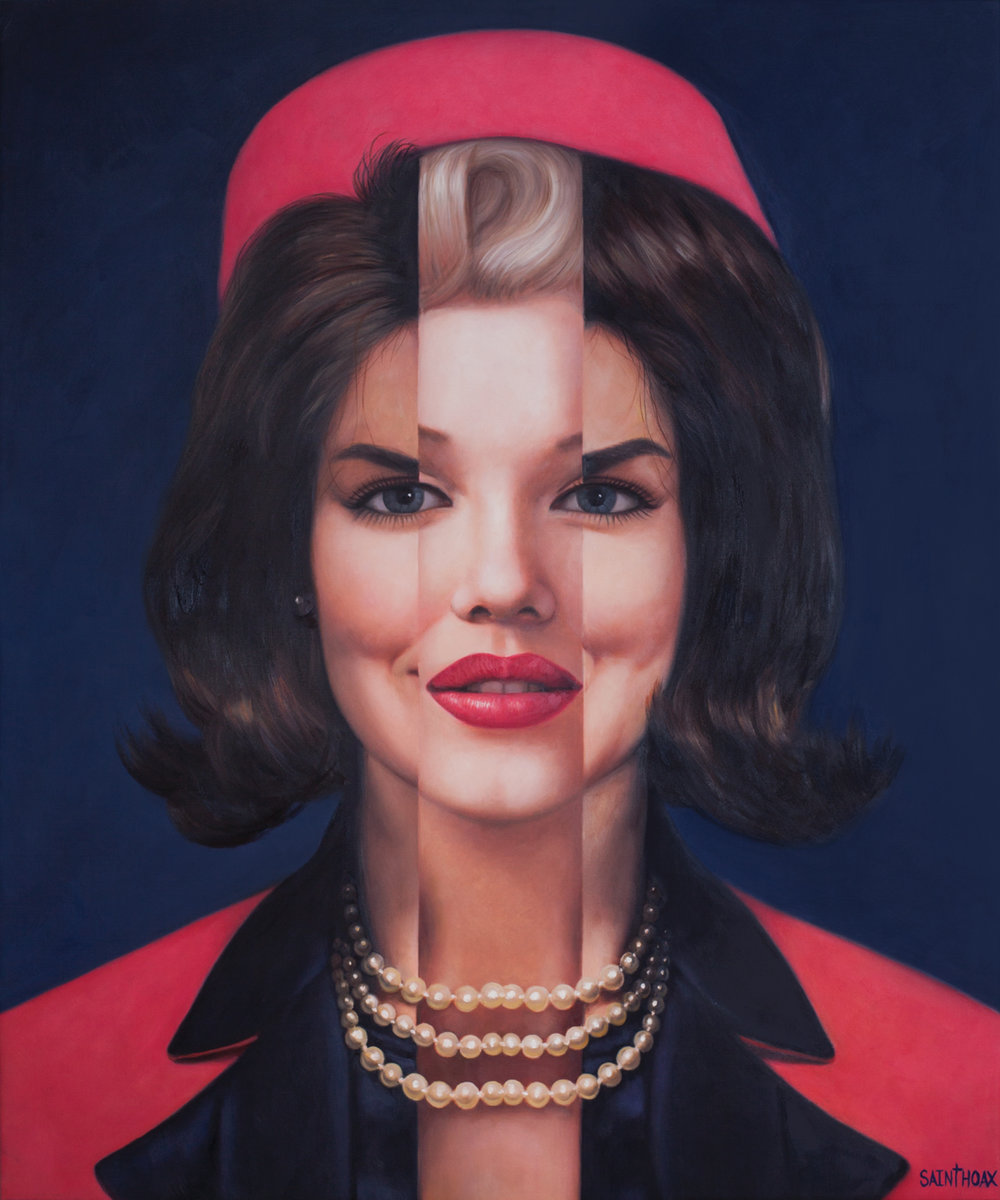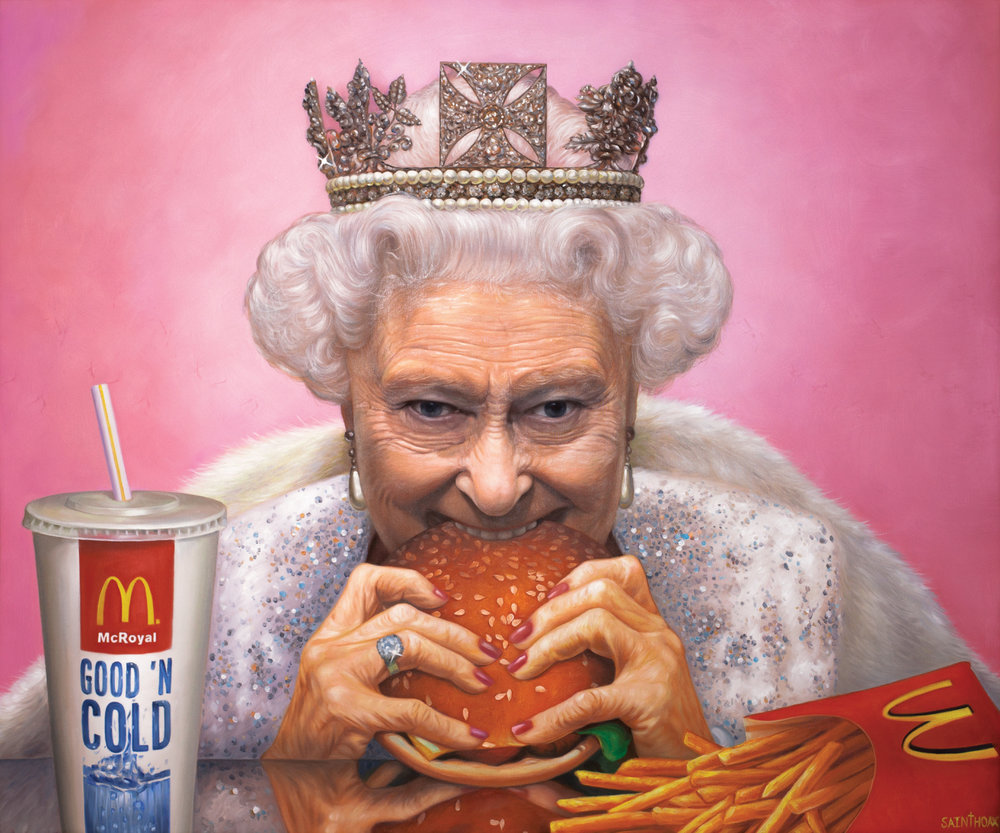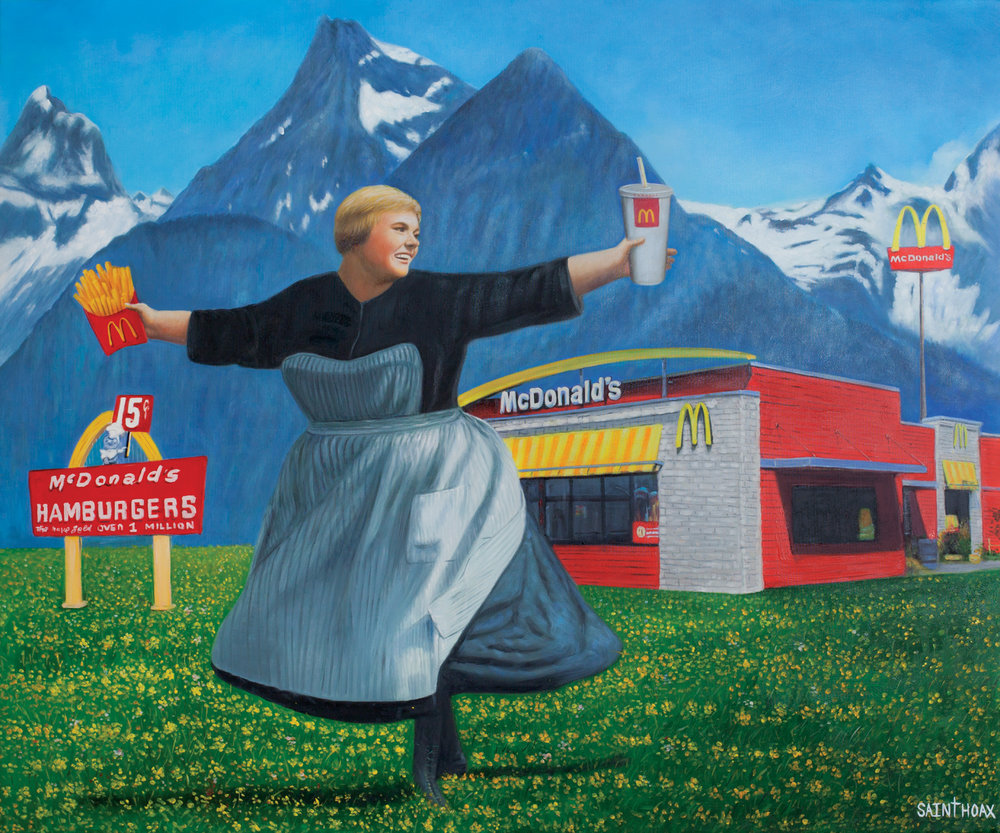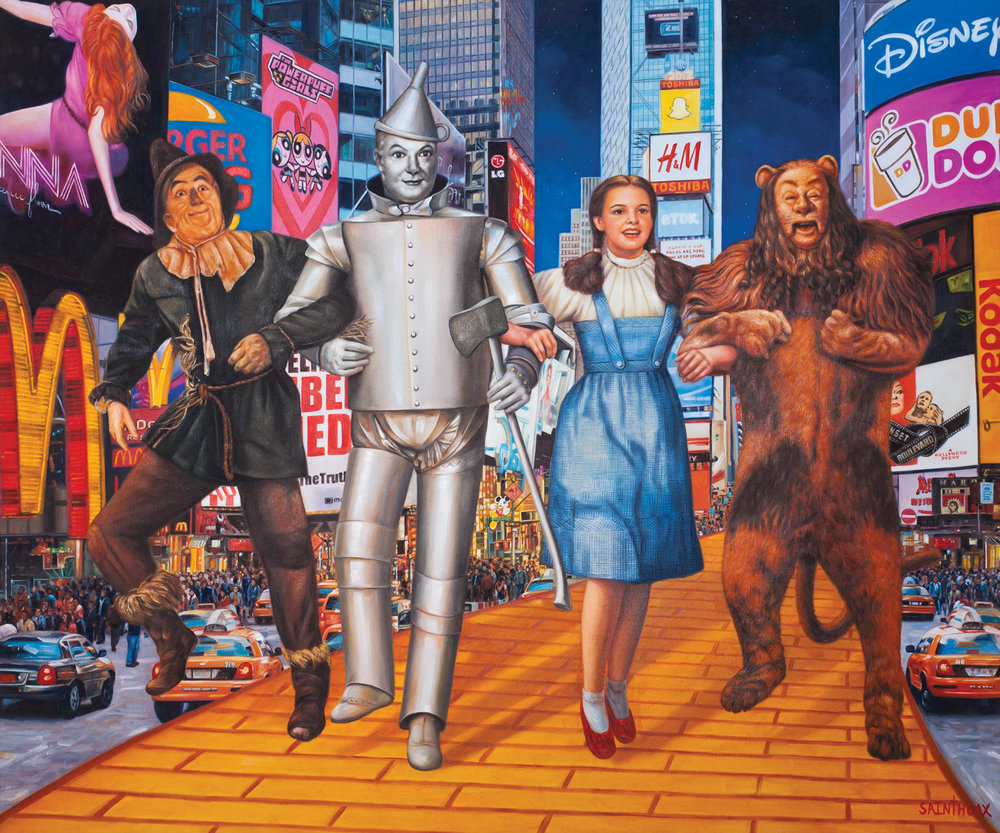SAINT HOAX - Making it POP
Making it POP
Saint-Hoax took the digital art scene by storm with her/his very first series, the eye-catching and controversial “War Drags You Out” featuring world leaders dressed in drag. Since then, S/he has taken Instagram by storm, garnering almost half a million followers and getting reposted by Hollywood A-listers including Madonna and Diplo. Although s/he quickly became a poster child for “Insta-Fame”, her/his work has also been featured in solo exhibitions around the world, cementing her/his legitimacy as an artist and an activist.
Where does the pseudonym come from and why are you hiding your identity?
A saint is someone who is meant to be pure, and a hoax is a misleading lie. When you put them together they create a beautiful contradiction, a “pure lie”. This is the simplest way to describe my vision since I manipulate images and icons in a deceptive manner in order to tell a certain truth. At first, I was hiding out of fear. I attracted some negative attention when I portrayed the late king of Saudi Arabia as a drag queen. I received a lot of death threats that I had to take seriously since I was still living in the Middle East. It was safer for me to stay out of the spotlight. That gave me the freedom to share whatever came to my mind without any censorship. Even after people got over the "drag king" artwork, I still enjoyed the inaccessible platform that I created for myself.
Since nobody really knows who you are, you could be anybody. If you had to choose, what would you look like and who would you be?
I would be the love child of the Red Queen (Helena Bonham Carter) and The Mad Hatter (Johnny Depp). I’ll have her inflated head and his chiseled jawline.
Despite the shroud of mystery, you’ve identified yourself as a Syrian artist. Why?
I was outraged when Trump compared Syrian refugees to a “Trojan Horse”. As a reaction, I worked with Plastik Magazine on a campaign to raise awareness about refugees. As we were promoting the campaign, I mentioned in one of the interviews that I’m Syrian. Most of the people who follow my work are based in Europe and the US. My reference to American popular culture made it seem like I’m an American artist. So I added “Syrian” to my biography to help change the way people perceive us. There’s more to Syrians than just war.
What is your take on the Trump administration and the drastic measures it’s taken against Muslim refugees?
Every country has the right to protect its borders from terrorism and other dangers. However, the way the Trump administration specified that said danger could only come from these seven countries is discriminatory. Especially since 90% of the citizens from these countries are Muslim. The way that they announced the ban was extremely racist and unorganized.
Has it affected you personally?
Of course it did! I’m a Syrian citizen born in a Muslim family. In a Trump universe, I’m a walking/talking “threat to US national security”. Boo!I have a solo art show coming up in New York that I won’t be able to attend because of that ban.
You’ve produced work associated to many social causes: Syrian refugees, eating disorders, domestic abuse, women’s rights and the list goes on. Is there one in particular that you relate to the most? Why?
“Once Upon A War” is my all time favorite awareness campaign. I got to play dress up with Syrian children who are temporarily residing in a refugee camp in Lebanon. It was the closest I have ever been to the Syrian crisis. It was a bittersweet experience.
Your tagline is “poplitically incorrect”. What’s your take on political correctness? A necessary evil or a syndrome of collective hypocrisy?
I wouldn’t call it a necessary evil; it’s more of a necessity to achieve coexistence. Just because I'm not offended by a certain subject, that doesn’t give me the right to treat it lightly if it offends someone else.
However, when it comes to satire and art, political correctness becomes censorship and that is something that I’m completely against.
In line with your “poplitically incorrect” tagline, you seem to have mastered blurring the lines between pop culture and politics. According to you, are they one and the same?
The president of the United States is a former reality star. That’s the blurriest the line has ever been!
Today, political news doesn’t only come through news outlets. Some of the news that I encounter actually comes in a form of a meme. It’s like “news for dummies” or simplified news, which is allowing people of all ages and interests to get involved in politics. The 2016 US elections were more pop culturally relevant than Beyonce’s Lemonade.
That being said, I think it’s a good thing. Merging politics with popular culture is getting the millennials more involved with the world. I don’t mind if activism becomes a trend.
“Merging politics with popular culture is getting the millennials more involved with the world. I don’t mind if activism becomes a trend.”
Which pop culture personality is most inspiring to you?
If I’m going for someone dead, I would definitely say Walt Disney. I’m really inspired by his thought process and how he chose to translate his vision through a universal language. By doing that, he managed to get billions of people involved in his dream. What more can a person ask for?
However, if I’m thinking about someone more contemporary, it would be Madonna. The fact that 35 years later she remains musically and socially relevant can only mean that she has mastered her craft.
Is there any celebrity that you really wouldn’t mess with? Who and why?
I don’t think I ever want to be on Cher’s bad side, because “Wtf is mdna?” will go down in history books.
You seem to have a particular fixation on all things Disney, who’s your favorite Disney character?
The one and only queen of the ocean, Ursula!
I have always favored Disney villains over the main characters, but Ursula’s malicious wit is “divine”. I literally have her face tattooed on my forearm. All she really wanted was to get back into the palace, overthrow King Triton, and rule the seven seas. Don’t we all?
“My reference to American popular culture made it seem like I’m an American artist. So I added “Syrian” to my biography to help change the way people perceive us. There’s more to Syrians than just war.”
If you had to cast this character in a live action film, who would you cast?
Ursula has to be played by a drag queen! I think Ginger Minj from RuPaul’s Drag Race would do a great job.
Digital art has had its own Cinderella story, going from being shunned by the art world to dominating it in the knick of time. How do you think digital art’s legitimization affected the international art scene?
Digital art has come a long way in the last three years. Social media completely changed the way we share and receive art.
It used to be more difficult for art lovers to discover artists on their own. Gallery owners controlled the art scene by highlighting whomever they deemed worthy. Most galleries didn’t take digital art seriously; therefore, it wasn’t displayed for the public. And how can the public demand something that they have little knowledge about?
Now with the rise of “insta-art” everyone has an equal chance to exhibit his/her work. There are so many social platforms for artists and art lovers to interact on. It changed everything!
Despite the ongoing trend, you seem to be transitioning from digital art to traditional art. How come?
The first thing I ever published as Saint Hoax was a painting of Bin Laden in drag. It took me over a month to paint. After it was done, I realized that no one would want to hang this on his wall, not even me!
There were so many things that I was eager to visualize. Some of them were more instant than timeless. Creating them digitally seemed to be more fitting than a painting. So instead of painting the rest of my “War Drags You Out” series, I decided to digitally illustrate it. I completed the series in less than three weeks!
People online didn’t really care about the medium. They were more interested in the final outcome. That digital shift helped me visualize more ideas in less time. The more material I shared, the more people were taking notice of my work. So I put my paintings on hold and focused on growing my digital platforms. After I reached half a million followers, I decided that it’s time for me to bring out the paint again. So technically, I’m going back to what I initially started.
Does your creative process remain the same when creating traditional art?
My creative process always involves digital sketches because I’m VERY indecisive. There’s so much more space for me to experiment on a digital canvas. It’s comforting to know that in one click I can undo an action. Once I’m 100% satisfied with the sketch, I turn it into a painting.
Have you ever attended your exhibitions in person? If so, what’s it like to stand amongst your fans in complete anonymity?
Yes, and it’s the best feeling in the world! I’ve talked to so many people at my exhibitions without them actually knowing that I’m the artist. I get to hear their unfiltered opinion about my work. Not many people get to experience that kind of transparency.
What’s next for Saint-Hoax?
I’m preparing for my third solo show, which is opening in May. Until then, more PoPlitical incorrectness.
INTERVIEWED BY RALPH ARIDA
